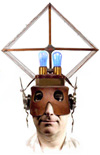A lot of my recent reading has dealt with consciousness and –by extensions– reality. It has completely changed the way I see my world. Literally.
“Your senses are your windows on the world, and you probably think they do a fair job at capturing an accurate depiction of reality. Don’t kid yourself. Sensory perception – especially vision – is a figment of your imagination. “What you’re experiencing is largely the product of what’s inside your head,” says psychologist Ron Rensink at the University of British Columbia in Vancouver, Canada. “It’s informed by what comes in through your eyes, but it’s not directly reflecting it.”
“In conjuring up this “now”, the visual system has to do something even more remarkable: predict the future. Information striking the fovea cannot be relayed instantaneously to conscious perception: first it has to travel down the optic nerve and be processed by the brain. This takes several hundred milliseconds, by which time the world has moved on. And so the brain makes a prediction about what the world will look like about 200 milliseconds into the future, and that is what you see. Without this future projection you would be unable to catch a ball, dodge moving objects or walk around without crashing into things.”
“The problem with attention is that it is a limited resource. For reasons that remain unknown, most people are unable to keep track of more than four or five moving objects at once. That can lead your visual system to be oblivious to things that are staring you in the face.”
My favorite line from this piece: “Essentially we experience the brain’s best guess about what is happening now.”

